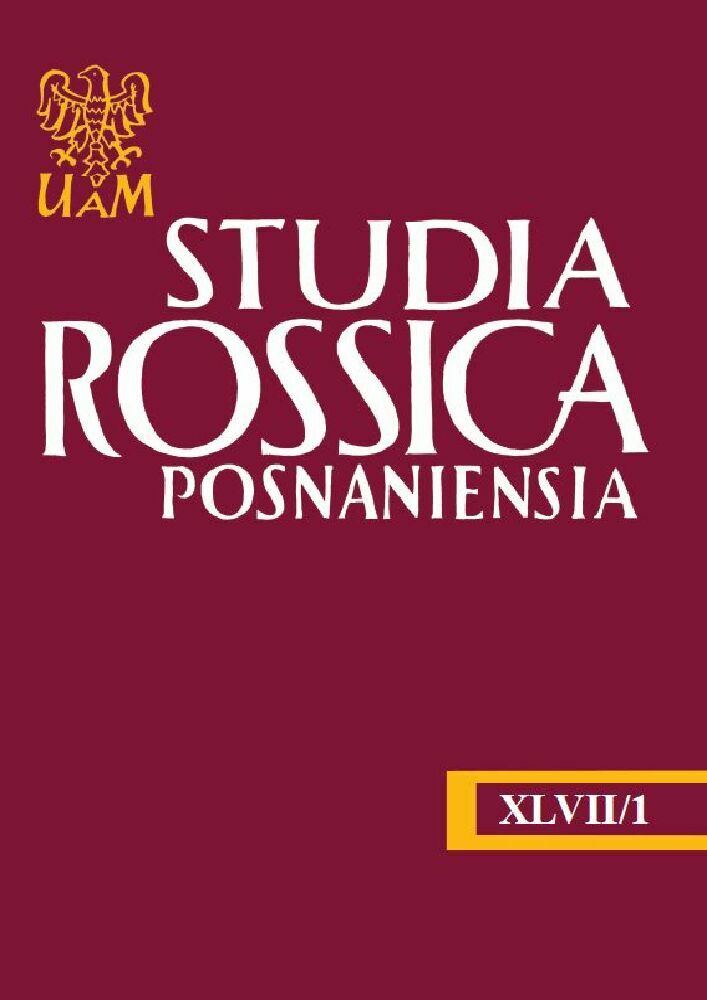Abstrakt
In 2018, the story of the unsuccessful poisoning of the Skripals by Russian special services shocked the world, and the further appearance of “Petrov” and “Boshirov” in an interview with Margarita Simonyan with completely implausible explanations led to the emergence of many memes and humorous works. The satirical play by Viktor Shenderovich To see Salisbury (2019) can be considered as one of the most significant reactions created by Russian-speaking society to the lies of the state. It is successfully performed abroad and, of course, has no chance of being staged in Russia. The author asks the question: what if everything that Petrov and Boshirov told in a scripted interview on the air of on Russia Today is true, and they are not unsuccessful spies, but a couple of gay lovers who are interested in Gothic cathedrals and the Charter of Liberties? Reflections on their own blurry unstable identity led the characters to an existential crisis in the spirit of the Theatre of the Absurd. This paper analyses how the absurdity of reality in the play serves to create a comic effect. Shenderovich grounds his satire based on direct citation of the precedent text of the interview, known a priori to every Russian-speaking recipient, on the intertexts of the Russian linguistic culture, fills the gaps of perception with paradoxes, and answers the questions asked by the audience after the RT broadcast (Why do the passport numbers differ by one digit? Why do the characters know Simonyan’s personal phone number? etc.).
Bibliografia
Bahtin, Mihail. Tvorčestvo Fransua Rable i narodnaâ kulʹtura srednevekovʹâ i Renessansa. Moskva, Hudožestvennaâ literatura, 1965.
Belâev, Aleksandr, red. Èstetika: Slovarʹ. Moskva, Politizdat, 1989.
Kernan, Alvin. The plot of satire. New Haven, Yale University Press, 1965.
Konze, Èdvard. Buddizm: suŝnostʹ i razvitie. Sankt-Peterburg, Nauka, 2003.
Lassan, Èleonora. „V. Šenderovič. Solo na flejte: k probleme opredeleniâ žanra (meždu zloj satiroj i literaturnoj fugoj)”. Žanry reči, 6, 2020, s. 146–154.
Petrova, Aleksandra, Valeriâ Tyčenko. „Političeskaâ satira v sovremennoj Rossii”. Âzyk i socialʹnaâ dinamika, 12, 2012, s. 185–188.
Remizov, Vâčeslav, Artëm Movčan. „Priroda komičeskogo i formy ego reprezentacii v sovremennom rossijskom televidenii”. Vestnik MGUKI, 3, 2016, s. 93–98.
Salʹnikova, Ekaterina. „Včera. Perestroečnoe TV”. Televidenie meždu iskusstvom i massmedia. Red. Anri Vartanov. Moskva, Gosudarstvennyj institut iskusstvoznaniâ, 2015, s. 423–444.
Sinegubova, Kapitalina, Natalʹâ Šiškina. „Stereotipizaciâ v političeskoj satire”. Kommunikativnaâ kulʹtura: istoriâ i sovremennostʹ. Red. Olʹga Žuravelʹ. Novosibirsk, IPC NG, 2021, s. 181–186.
Slepakov, Semën. Pesnâ o Solsbereckom špile. 2018. Web. 23.08.2021. https://disk.yandex.ru/i/DUMZekts1M3q7g.
Svetlakov zaâvil o zakrytii „Prožektorperishilton” iz-za cenzury. 2019. Web. 23.08.2021. https://www.rbc.ru/society/31/10/2019/5db95b039a79474c10fcedb4.
Šelenok, Mihail. „Problematika i poètika pʹesy V. Šenderoviča Dva angela, četyre čeloveka”. Filologos, 8, 2019, s. 90–97.
Šenderovič, Viktor. Uvidetʹ Solsberi. 2019. Web. 23.08.2021. http://webcache.googleusercontent.com/search?q=cache:w53z4mPSCFkJ:https://xn----gtbbdqgdocqd.xn--p1acf/plays/uvidet_solsberi.html&client=safari&hl=pl&gl=pl&strip=1&vwsrc=0.
Viktor Šenderovič čitaet pʹesu „Uvidetʹ Solsberi”. Web. 23.08.2021. https://www.youtube.com/watch?v=RjspVNh0nYc&t=2794s.
Weisenburger, Steven. Fables of subversion: Satire and the American novel, 1930–1980. London, University of Georgia Press, 1995.
Licencja
PRACE PUBLIKOWANE W CZASOPIŚMIE DOSTĘPNE SĄ NA LICENCJI CREATIVE COMMONS:
Uznanie autorstwa-Użycie niekomercyjne-Na tych samych warunkach 4.0 Międzynarodowe.
Autorzy tekstów przyjętych do publikacji w czasopiśmie „Studia Rossica Posnaniensia” są zobowiązani do wypełnienia, podpisania i odesłania na adres redakcji umowy o udzielenie nieodpłatnej licencji do utworów, z zobowiązaniem do udzielania sublicencji Creative Commons.
Zgodnie z umową, autorzy tekstów opublikowanych w czasopiśmie “Studia Rossica Posnaniensia” udzielają Uniwersytetowi im. Adama Mickiewicza w Poznaniu niewyłącznej i nieodpłatnej licencji oraz zezwalają na użycie sublicencji Attribution-NonCommercial-ShareAlike 4.0 International (CC BY-NC-SA 4.0).
Autorzy zachowują prawa do dalszego, swobodnego rozporządzania utworem.
Autorzy, którzy wykorzystują w swoim tekście cudze utwory (np. ilustracje, fotografie) proszeni są o dostarczenie do redakcji czasopisma zgody na publikację.
Użytkownicy internetu uprawnieni są do korzystania z utworów opublikowanych po 2015 roku “Studia Rossica Posnaniensia” tylko w celach niekomercyjnych, pod następującymi warunkami:
https://creativecommons.org/licenses/by-nc-sa/4.0/
Uniwersytet im. Adama Mickiewicza w Poznaniu zachowuje prawo do czasopisma jako całości (układ, forma graficzna, tytuł, projekt okładki, logo itp.).

